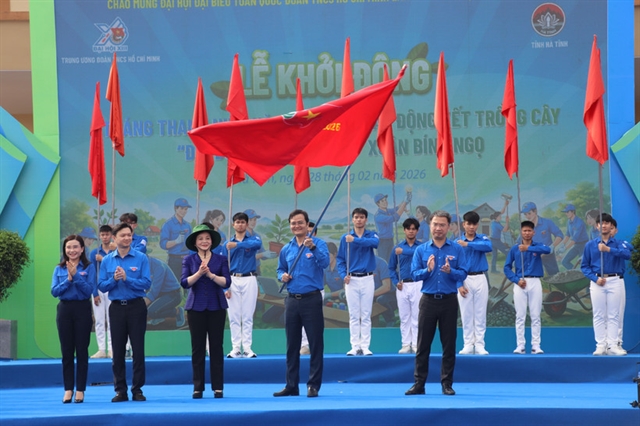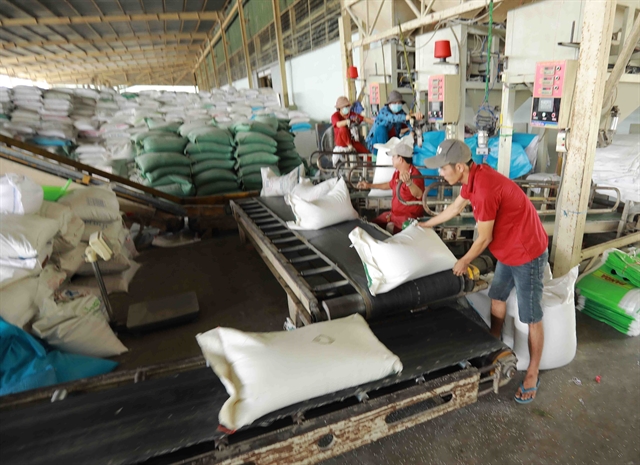 Society
Society


|
| Every day, Phan Minh Investment Service Trading Company, located in My Hoa Hung Commune, Long Xuyen City, An Giang Province, processes and packages approximately 30,000 tonnes of rice. — VNA/VNS Photo Vũ Sinh |
HÀ NỘI — To ensure an adequate national food reserve (NFR) and proactively prepare for and respond effectively to emergency situations, urgent cases related to disaster prevention, fire and epidemics, the General Department of State Reserves (GDSR) has proactively reviewed the resources of the national food reserve.
In accordance with Directive No. 24/CT-TTg issued by the Prime Minister on August 5 regarding ensuring the resilience of national food security and promoting sustainable rice production and exports during the current period, the GDSR has proactively reviewed the resources of the national food reserve. This is to ensure the maintenance of an appropriate level of reserves, meeting the requirements set out in the National Reserve Law and being able to respond promptly and effectively in urgent situations, such as shortages of food or rice, natural disasters, and epidemics.
Additionally, the GDSR closely monitors market developments, forecasts climate change, natural disasters, and epidemics, ensuring food security and the supply needs of localities. This is done in close coordination with relevant ministries and agencies to provide timely recommendations to the Ministry and the Prime Minister for supplementary plans and budgets for 2023 to purchase additional reserves for the National Food Reserve if deemed necessary.
Furthermore, the GDSR is developing a plan for purchasing food for 2024 with an appropriate reserve level, ensuring that reserve resources are ready for timely delivery according to the decisions of competent authorities, and contributing to market stabilisation when necessary.
The GDSR is also focusing on achieving the targets of the National Food Reserve Plan for 2023 as assigned by the Prime Minister by closely coordinating with winning contractors to expedite placing contracted rice quantities into storage. The GDSR is also diligently carrying out the preservation and safeguarding of the quantity and quality of the National Food Reserve stocks.
Moreover, they are creating favourable conditions for contractors to execute their rice contracts, flexibly managing the import and export of National Food Reserve stocks as per the 2023 plan, in line with the actual situation, to ensure the efficient utilisation of National Reserve resources.
Given the significant market fluctuations in food supply, demand, and prices at the time when NFR rice imports was being organised on August 18, 2023, the GDSR issued Document No. 1259/TCDT-KH. This document urgently requests the Regional General Departments of State Reserves and related units to proactively implement solutions, expedite the completion of rice imports as per signed contracts, and timely resolve any difficulties or issues that arise during the implementation of these tasks within their authority.
Furthermore, the GDSR emphasises the importance of closely monitoring the dynamics of the food market, forecasting, and assessing factors that may affect the execution of signed National Food Reserve rice contracts. This ensures that appropriate solutions are devised to maintain quality and meet the set schedules.
The Regional General Departments of State Reserves are also required to collaborate closely with local authorities to identify any needs for relief or assistance with National Food Reserve rice. They should report to and advise the GDSR on the management of imports, exports, and the periodic exchange of National Food Reserve rice, ensuring efficient utilisation of national reserve resources, in line with the actual circumstances.
Additionally, the GDSR calls on specialised units to actively review and balance National Food Reserve resources to provide timely recommendations to the competent authorities for additional procurement plans if necessary. The objective is to maintain appropriate National Food Reserve levels, ensuring readiness and efficient responses in urgent and emergency situations to prevent food shortages and price spikes during harvest failures, natural disasters, or epidemics.
The GDSR emphasises the need to disseminate and thoroughly implement the legal provisions regarding national reserves, the regulations of the Ministry of Finance, and the directives of the GDSR in the import, export, preservation, and protection of the quantity and quality of National Food Reserve rice. It encourages a sense of responsibility and dedication among civil servants, employees, and workers to serve the people diligently in carrying out the task of distributing National Food Reserve rice, ensuring social well-being, and stabilising the livelihoods of the population. Any misconduct, negative actions, or disruptions during the process of importing and exporting National Food Reserve rice will be strictly dealt with according to the established regulations and the authority of the respective units, as stated by the GDSR representative.
A recent estimate by the Ministry of Agriculture and Rural Development stated that Việt Nam's domestic demand for rice in 2023 is 29.5 million tonnes, which Minister Lê Minh Hoan on August 13 reaffirmed would ensure food security. — VNS